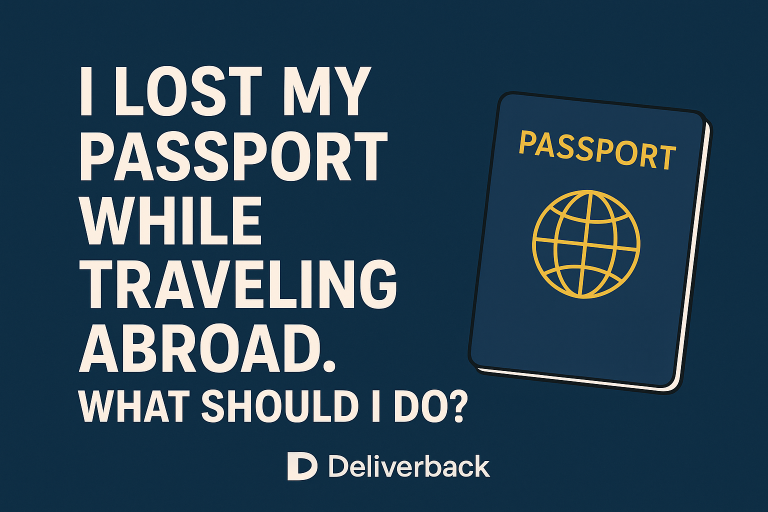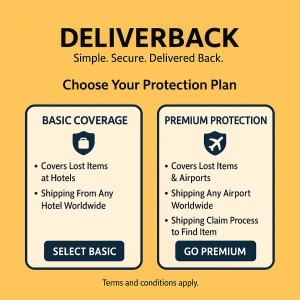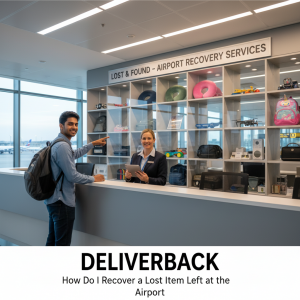Losing a passport is every traveler’s nightmare. It’s not just a passport—it’s your identity, your ticket home, and your lifeline abroad. If this happens to you, don’t panic. Take a deep breath. The key is to act quickly and remain calm. In this blog post we’ll walk you through a step-by-step guide on what to do right now, and how the process differs depending on where you lost your passport: at an airport, at a business such as a hotel or car rental, or in a public space.
1. Stay calm and confirm what’s lost
First things first: before rushing off in panic, take a moment.
- Confirm that it really is your passport that’s lost.
- Think back: when did you last have it? Where did you go afterwards?
- Search all your personal bags, jacket pockets, secure places you visited (hotel room safe, car glove box, etc.).
- Make sure you haven’t just misplaced it somewhere—it’s far easier (and cheaper) to retrieve a mis-placed passport than a truly lost/stolen one.
Once you’re sure it’s gone (or you can’t find it after checking), it’s time to act.
2. Report it to the correct authority depending on where you lost it
A) Lost at an airport
If you lost your passport in an airport — say at check-in, security, a lounge, gate area, baggage claim — you should submit a claim via the appropriate lost-and-found service. One such service is Deliverback. According to their website, when items are lost in the airport terminal or associated areas, you can begin by submitting a claim at:
https://claims.deliverback.com/
Deliverback – Get your lost item back+2Deliverback – Get your lost item back+2
Key points in this scenario:
- Provide as much detail as possible: date/time you last had the passport, terminal/gate/area, description of the passport (cover colour, any markings, your name).
- Note: passports are extremely sensitive items, so recovery may involve law-enforcement or airport ‘lost & found’ protocols beyond standard items.
- If you lost more than your passport (e.g., wallet with ID cards, driver licence, etc.), treat those as well, but ensure the passport is flagged as urgent.
- While you wait, contact your country’s embassy or consulate (see section 3 below) for replacement travel document options.
B) Lost at a business (hotel, car-rental, museum, etc.)
If you left your passport at a business location — for example:
- a hotel you stayed at
- a car rental company’s desk or vehicle
- a museum or event venue
- a cruise ship terminal or ferry operator
then the lost-and-found recovery process is typically handled differently. For locations covered by Deliverback’s business-lost-&-found shipping service, you should submit an order (not a “claim”) at:
https://orders.deliverback.com/
This is the portal to arrange shipping of found items back to you from participating businesses. (Deliverback’s website lists hotels, car rentals, ferries, etc. as partners.) Deliverback – Get your lost item back+1
What to do:
- Immediately contact the business via phone or email if possible; inform them you lost your passport, ask if it has been found.
- If they confirm they have located it, then fill out the order form so the business, working with Deliverback, can send it back to you.
- Make sure you verify how you’ll authenticate identity when you receive the passport (very sensitive item).
- If the business does not have it, still proceed with the form (or at least a notification) so the item is flagged and the process is in motion.
C) Lost in a public space (street, café, taxi, park etc.)
If you suspect your passport was lost (or stolen) in a public space—not clearly within an airport or a registered business location—you must take more urgent steps:
- Immediately report the loss/theft to the local police department in the country/town where it happened. Ask for a report number, reference number or case number.
- Use this police report when you contact your embassy/consulate (see section 3).
- Also take the extra step of contacting your country’s embassy/consulate (even if you plan to recover the passport via lost-&-found later) because the risk of theft or misuse is higher in public spaces.
- If you think the passport may have been stolen (rather than merely lost), request that they mark the document as invalid/stolen in your home country’s passport system if applicable (some countries have a registry).
- Keep copies of all communications, report, receipts, etc.
3. Contact your country’s embassy or consulate
Regardless of where the passport was lost, you must contact your home country’s embassy or consulate as soon as possible. Here’s what they can help you with:
- Issue an emergency travel document so you can continue your trip or return home.
- Advise on how to replace the lost passport permanently once you return home (or even abroad, depending on your country).
- Inform you about any potential fraud or misuse of your lost passport.
- Guide you on how to manage visas, travel itinerary changes, return flights, etc.
Important steps when you contact them:
- Provide them with your passport number (if you know it), date of issue, place of issue, and the circumstances of loss.
- Present the police report (in the case of theft/loss in public space) if you have it.
- Ask for an official written confirmation of what has been done or will be done (e.g., marking the passport invalid, issuing a temporary document).
- Ask about visa implications, especially if you had multiple-entry visas or were in transit.
- Ask how long it will take to get the replacement (it may vary greatly depending on where you are).
4. Protect your identity and travel documents
Losing your passport is not just about losing a document—it’s also about protecting yourself from identity theft or misuse. Here’s what to do:
- Immediately notify your home country’s passport authority that the document is lost/stolen. They may block the number from being used.
- Monitor your financial accounts if your wallet or other identity cards were lost along with the passport. Consider changing PINs, canceling credit cards if necessary.
- If the lost passport had visas, residence permits, or stamps for other countries, alert those immigration authorities if required.
- Keep copies (digital and paper) of your passport and other important documents. Having scanned copies stored securely can help with identity verification and replacement.
- Be extra vigilant for suspicious emails or calls—someone might attempt to use your lost identity to commit fraud.
5. Travel logistics: what you can expect
Losing your passport means logistical complications—but most travelers manage to recover or continue their trip with the right steps. Here’s what to prepare for:
Travel delay and re-booking
- If you need to stay in one place while replacement documents are issued, be prepared for extra accommodation costs.
- Airline rebooking may be necessary if your flight is cancelled or you cannot board without a valid passport.
- Inform your travel insurance provider about the lost passport; some policies cover associated extra costs (hotel, rebooking fees) if you take the right steps.
Cost of replacement
- Emergency travel documents often carry a fee.
- Shipping of the lost passport back to you (if found) may involve courier or logistics costs (especially if you’re overseas). With Deliverback, for example, there may be shipping charges. Deliverback – Get your lost item back
- If visas or residency permits were lost or invalidated, you may need to reapply and pay fees.
Returning home
- When you have your replacement or emergency document, double-check with your airline and destination country if special permissions or visas are required.
- Keep the police report, documentation from your embassy/consulate, and receipts for any out-of-pocket expenses—these may be required for travel insurance claims or reimbursement.
6. Specific steps checklist: what to do right now
Here’s a quick checklist you can follow:
- Confirm the loss: search your bags, pockets, safe.
- Where did it go missing? Determine location: airport / business / public space.
- Take action depending on location:
- Airport → submit claim via https://claims.deliverback.com/
- Business (hotel, car rental, museum etc.) → contact business & submit order via https://orders.deliverback.com/
- Public space → report to local police immediately.
- Contact your home country’s embassy/consulate to report and request emergency travel document.
- Notify your home passport authority and request the passport be invalidated if necessary.
- Check and secure your identity and financial items (monitor accounts, cancel cards if needed).
- Keep copies of all documents, receipts, communications—especially if you’ll claim on travel insurance.
- Follow up persistently: lost item services and embassy procedures can take time, so maintain contact.
- Prepare for extra travel expense or delay and consider travel insurance coverage.
- Once recovered / returned: apply for a new passport (if needed), replace visas/permits, update travel contacts and retain the police report for your records.
7. Why using a service like Deliverback helps
If you lost your passport at a business location (hotel, car rental etc.) or in an airport terminal, leveraging a specialised lost-and-found shipping service such as Deliverback can simplify things:
- They partner with hotels, airports, car rental companies, ferries and more to streamline returning lost items. Deliverback – Get your lost item back+1
- For businesses, Deliverback offers a free solution to better manage their lost & found items—so they’re more likely to cooperate quickly. Deliverback – Get your lost item back
- For you as a traveller, it means you don’t have to coordinate shipping details across international borders—they handle the logistics, you follow the form.
- Important: for airports outside certain regions the service may be limited to search only, not shipping. Always check the details. Deliverback – Get your lost item back+1
So if your passport was left behind in a hotel room or rental car, this kind of service can be extremely helpful in getting it back to you.
8. What not to do
Losing a passport is stressful, but avoid doing the following:
- Don’t wait too long to report it. The sooner you act, the higher your chances of recovery and the lower your risk of identity misuse.
- Don’t ignore the lost insurance/identity implications. Merely replacing the document may not protect you from fraud or misuse.
- Don’t assume lost means gone forever. Many items are recovered if reported promptly—so act instead of giving up.
- Don’t use unverified “lost & found” services or pay large sums without confirming legitimacy. Use reputable channels (embassy, official lost & found, recognised services) only.
- Don’t leave your emergency contacts uninformed—inform family/travel companions of your situation so someone knows what’s happening.
- Don’t forget to update your travel insurance provider—they often have time-limits for loss reporting.
9. Realistic expectations and emotional side
Let’s be honest: losing your passport is inconvenient and stressful. You may feel frustrated, anxious, and disrupted. That’s normal. Here’s what to keep in mind:
- It can cause delays, cancelled flights, added costs—but it doesn’t have to end your trip. Many travellers carry on once they have the right temporary document.
- Recovery may take time. Don’t assume it will be immediate. Maintain communication and patience.
- The embassy/consulate staff are used to this. Be clear, calm, and compliant—they’re there to help.
- Use this as a learning moment: next time, you might travel with a photocopy of your passport, keep it separately from the original, use hotel safe, etc.
10. In summary
Losing your passport while abroad is a major hiccup—but one you can manage with swift, organised action. Here’s the bottom line:
- Determine where you lost it (airport / business / public space).
- Use the correct path:
- Airport → Submit claim at https://claims.deliverback.com/
- Business location → Contact business + submit order at https://orders.deliverback.com/
- Public space → Report immediately to local police.
- Notify your embassy/consulate and home passport authority.
- Secure your identity, monitor finances, keep records.
- Be patient, persistent and realistic.
When you’re abroad the key is speed, clarity and cooperation. Act immediately, communicate clearly and use the right channels. Before you know it, you’ll be back on track—passport-ready, travel-ready, and wiser for the experience.
Safe travels—and may your passport always stay by your side!


